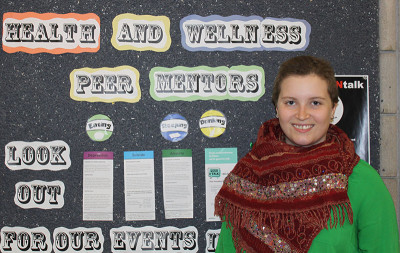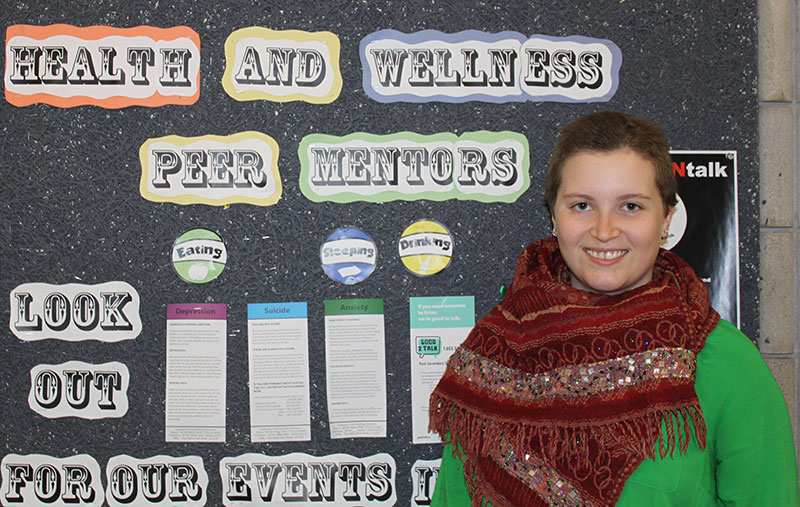
STORY BY BRANDON MARTINEZ
Eating. Drinking. Sleeping. Safe sex.
That is the slogan of a new hall outreach campaign organized by Sheridan’s Health and Wellness Peer Mentors program, which offers lifestyle advice and counseling to struggling students.
Cheryl Cnoop-Koopmans, 27, is a counselor at student services and oversees the peer mentor program.
“The program has been around for about 14 years and was previously split between health and wellness,” Cnoop-Koopmans said in a sit-down interview. “But this year we brought together ideas of mental and physical health.”
The purpose of the program is to teach students about healthy living practices and habits and to give students an outlet to seek help. “Not eating or sleeping well leads to a poor mental and physical state,” said Cnoop-Koopmans.
There are six peer mentors at Sheridan’s Trafalgar Campus who come from various programs. Mentors are required to be at least a second year student and have to maintain a certain GPA.
The response to the hall outreach initiative has been positive. “We have received a lot of response in the first semester. First year students are curious,” said Cnoop-Koopmans.
The program organizes events in the B-Wing of Sheridan and hosts gatherings at Mood Matters Café once or twice a week.
Justine Howard, 22, is a third year Sheridan Animation student who became a peer mentor last year.
Being a peer mentor is something that Howard feels suits her personality. “I’m open-minded, I like to help people, and I’m a good listener,” she said. “This year we’re promoting good sleeping, eating and drinking habits as well as safe sex.”
An average of 50-100 people show up for Health and Wellness events in B-Wing, according to Howard. “A lot of students don’t know about the program, so it’s important to let people know that there is help available on campus and there is always someone to talk to,” she said.
At Health and Wellness events, peer mentors set up a table with information pamphlets and organize games that incorporate key information from the pamphlets to make it more digestible, said Howard.
In addition to giving lifestyle and healthy living advice, Howard and her colleagues are trying to dispel stigmas about mental health by encouraging dialogue and openness on the subject.
Part of this mental health initiative is a new “Stick it to Stigma” campaign, which is seeking to break taboos surrounding mental health issues.
“There are more students who approach us about mental health concerns than you might think,” said Howard. “People generally don’t want to bring it up because of the embarrassment.”
Students with mental health issues have to want to seek help on their own and cannot be pressured into it, said Howard.
Interacting with and helping students who may not be on the right track is the most enjoyable part of being a peer mentor for Howard.
“We want students to get interested in these issues. If you’re not happy or healthy we will show you how to get there. We have the answers,” she said.
Howard was one of the organizers for an event on March 12 called “SHERIDANtalk: Breaking Barriers on Mental Health,” which featured health and wellness speakers Eric Windeler, Arthur Gallant and Mark Henick.
UPDATE: The Sheridan Talk event scheduled for March 12 was postponed due to bad weather. It has been rescheduled for some time in April.
